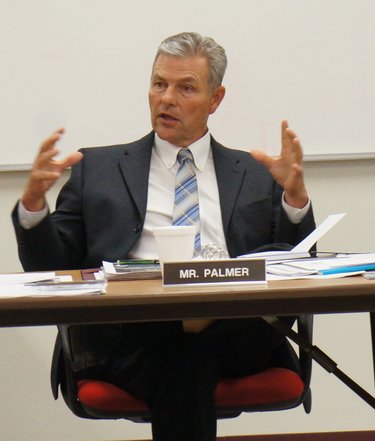BKW lays out plan for increased achievement
The Enterprise — Marcello Iaia
Too much testing? Interim Superintendent Lonnie Palmer during the Nov. 18 school board meeting addresses school board members after a presentation on improving student achievement. Learning math and reading, he said during the Dec. 2 meeting, is like growing a plant, or riding a bike. “They learn some while you’re talking to them, but they learn a heck of a lot more when they are actually doing it themselves and you’re monitoring what they’re doing, and you correct them as they go along so they get better at it,” Palmer said of students taking tests.
The Enterprise — Marcello Iaia
State Senator Cecilia Tkaczyk responds to board members during the Dec. 2 Berne-Knox-Westerlo school-board meeting. Tkaczyk, a Democrat, is on the Senate Education Committee and said she wants the 2014-15 budget to fully restore money kept from school districts since 2010-11 with the Gap Elimination Adjustment, an effort she made last year with other legislators that resulted in partial restoration of funds but did not do away with the GEA. Tkaczyk said she supports teachers’ unions demands of a three-year waiting period for tying teacher evaluations to state assessments and the ability for parents to opt out of allowing their students’ information to be used in third-party data storage.
BERNE — As the district adapts to new state learning standards, Berne-Knox-Westerlo administrators want to increase options for students and time for planning and data analysis for teachers.
Principals presented their Instructional Improvement Plan to the school board in November, and the board is expected to review projections of recent savings and requested expenses in January before voting on the measures.
The reforms are meant to meet some of the board’s top goals, of raising students’ overall achievement and moderating behavioral issues, and align the district with Common Core Learning Standards, which New York adopted along with most other states.
Asked by board members where the money for new materials, software, and staff would come from, Interim Superintendent Lonnie Palmer has said that savings made by consolidating bus routes and teacher aid and assistant posts since he arrived in June could be used.
Board member Vasilios Lefkaditis said he could not vote on a plan for hiring additional staff until he saw a detailed balance.
Audrey Roettgers, principal of the elementary school, submitted revised goal percentages for increasing math and English scores for students in third through sixth grades over a period of five school years, but board members asked for projections in January by grade level.
“We had five-year projections, where are they now? Where’s the accountability?” Lefkaditis asked of the previous board’s goals. He was elected to a three-year term in 2011. Three new members were elected to the five-member board this year.
Board goals were still being discussed at the mid-December meeting, but Palmer said, since the board’s brainstorming session over the summer, he has tried to present the goals in general terms to Roettgers and Secondary School Principal Brian Corey, for them to hone.
“I wanted them to own it, because that’s how accountability is achieved,” said Palmer.
What tests tell
Last year was the first for state tests based on the Common Core Standards, starting with grades 3 through 8. Students across the state averaged low scores, expected because of the rigor of the standards, the new ways of teaching, and the lack of time to make changes to align curriculum with the standards.
BKW elementary students’ test scores, compared with similar districts, range between the 29th to 36th percentiles in English, Roettgers said during the Dec. 2 school board meeting; for math, they ranged between the 7th and 36th percentiles.
Seventy-four percent of BKW students in third through eighth grades in English, and 83 percent in math, scored at levels 1 or 2, or “not proficient,” with 4 being the highest.
“How can my child be high honors in math and get a Level 1?” asked Lefkaditis during the Dec. 2 meeting. He gave examples of new questions on Common Core state assessments, calling them “absurd and inaccurate.”
By the 2015-16 school year, New York is supposed to have the comprehensive changes in place for kindergarten through 12th-grade testing. New computer-testing requirements are expected to be ready for the 2014-15 school year, pending a decision by the Board of Regents.
The federal Race to the Top initiative requires teachers be evaluated partly on student test scores, and the Common Core standards are being used for those tests.
Roettgers, whose elementary school has been using the new ways of instruction for longer than the secondary school, describes it as deeper understanding, “less traditional,” and “more teacher-driven,” giving teachers more responsibility rather than relying on textbooks.
“We’re asking kids to think a lot more than we used to ask them to think,” said Roettgers on Tuesday.
The elementary portion of the improvement plan would involve extra tutors for struggling students, and teachers’ aids to cover recess time while teachers analyze the results of their students’ tests. Palmer said Tuesday that two substitute teachers in the high school and two in the elementary school would cost about $25,000 for the remainder of the year.
Six part-time aids would be hired to cover teachers’ half-hour recess blocks, for a total of about $19,000 for the rest of the year, Palmer said. Working through their lunch breaks, if they choose, teachers could use a full hour each day to plan lessons and analyze data in what administrators called “professional learning communities.”
“I don’t know of a teacher that doesn’t work during their lunch,” Roettgers told the board, acknowledging that they are allowed to take a break during lunch.
Groups of teachers have already met by grade level to analyze the results of tests to determine what groups of students need extra help or more challenges.
Comparing the scores from last year to the tests given this fall, teachers projected how their students would score on state tests, said third-grade teacher William Dergosits at the Dec. 2 board meeting.
“According to last year’s data, we were able to find that students should get a 2 on the current state test,” said Dergosits. BKW uses computer tests by the Northwest Evaluation Association (NWEA) that adjust questions in real time based on a student’s previous answers.
“From there, we created these ‘living groups,’ to be adjusted as we see fit,” Dergosits said of high- and low-performing students.
Going forward, Dergosits said, elementary teachers would be identifying the strengths and weaknesses of specific students by “strands,” like reading, writing, and listening and learning.
“There may be areas of strengths that a low child might have, and it’s really not helping them much to keep them in that bunch during the lesson in which they might be confident in,” said Dergosits.
As examples of trends data has shown across grade levels, Roettgers cited word problems, the use of informational texts, and addition and subtraction as areas where students are struggling more. The informational, or nonfiction, reading is supposed to make up half of a student’s reading and is used to connect other subjects, like science or social studies.
The NWEA tests are used in all grades, but specifically for kindergarten through second because no state tests are administered in those grades.
Meeting needs
“Students who are met where they are are going to have fewer problems with behavior…and you’re going to find teachers more satisfied with the work they’re doing with students,” said Roettgers, telling the board that the time and support administrators are asking for would increase student achievement.
She was asked whether teachers believe in the changes.
“I can tell you what I see. I can’t tell you what I don’t see,” said Roettgers. “I would say, for the most part, I’ve found people willing to do this because, like I said, we want to do what’s best for kids and data is a vehicle we can use to analyze what is best for kids.”
Roettgers said the elementary school is planning a public meeting at the beginning of January for parents to learn about Common Core instruction.
For the high school, Corey said he and Palmer want to create alternative-education classrooms where teachers rotate through instead of students. Two of the classes would be formed for middle- and high-school students during the day, to begin, depending on student placements, as early as next fall. Another during the evening would cost less, Palmer said, and could be started in February, pending board approval.
Palmer described two types of students who could benefit from the alternative classes, which would be available to special- and regular-education students. Some students are bright but unengaged in the environment of a school, he said.
“You get them into an independent type of curriculum where the idea is not, ‘How much can I get away with in 180 days and avoid doing?’ but, instead, ‘Oh, I can be done as soon as this is done?’” Palmer said at the Nov. 18 board meeting. Responding to a board member’s concerns about “behavior problems,” Palmer said “behavior problems” are students who don’t work as well in the artificial environment of a school.
“Those kids need to be in a quiet, self-contained place where they can build a strong relationship with a caring adult,” said Palmer.
Older students, who could benefit from the evening class, might be working to support their families' low incomes or taking care of a child during the day, Palmer said.
The cost for the alternative classes could be made up in savings by bringing back to Berne those students who take classes elsewhere and require tuition and transportation, said Palmer. At $50,000 in tuition for one student, placing that student in the evening class would cover the $40,000 cost for one year; the other two classes would cost, depending on their size, $115,000 each.
If money saved by paying less in tuition doesn’t cover the costs, the board could look at what has been saved so far, Palmer said. He told The Enterprise Tuesday that a total of four out-of-district bus runs have been eliminated, with a spate of retirements and efficiencies in other runs, at an average savings of $100,000 each. He believes a fifth route inside the district could be saved as well.



